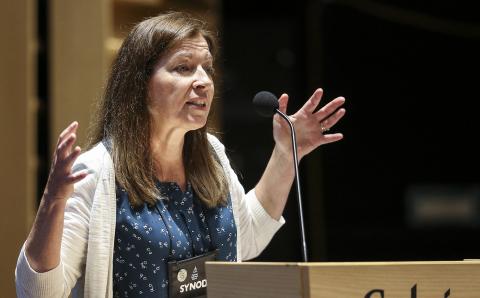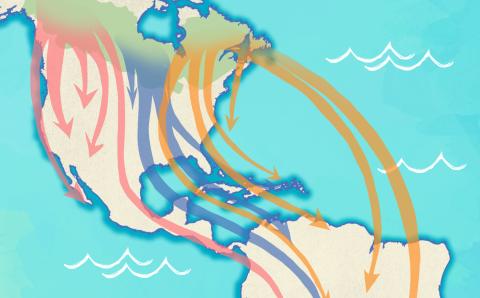I remember reading a Christian comic book as a youth back in Southeast Asia that depicted the rapture and the end times. But I have since changed my mind about rapture theology. Reformed theology does not support it.
What Is Rapture Theology?
The rapture is an end-times event some faith traditions believe in, one in which faithful Christians will be physically taken (raptured) from this earth. It is based mostly on Bible passages such as Matthew 24:39-41 and 1 Thessalonians 4:15-18. This theology gained prominence in the 19th century thanks to the Scofield Reference Bible. Since then it has been popularized through some Christian books, such as the Left Behind series.
In the most common version of this theology, the rapture is seen as rescuing the saints from impending suffering and Earth’s destruction. Christ’s second coming is seen as a two-stage event. First, Christ will secretly come to rapture his saints before a period of great suffering known as the Great Tribulation. Only rapture-ready Christians are taken into heaven, leaving others behind to suffer. After the seven years of tribulation, the second stage of Christ’s second coming will happen, this time for all to see. Christ will physically and politically reign for 1,000 years (the Millennium) from a throne in Jerusalem as king of the nation of Israel. During the Millennium, all the biblical promises to the nation of Israel will be literally fulfilled, and all Jews will become Christians. At the end of the Millennium, Satan and his forces, including human allies, will challenge Christ in the final battle (Armageddon), which will likely end up destroying the world in a nuclear holocaust. The final judgment will then occur, and the new heaven and earth will replace the destroyed Earth. This, in very brief summary, is the most popular version of rapture theology.
Implications of Rapture Theology
Two main implications of this theology are a diminished view of God’s creation and an overemphasis on “getting ready for heaven.” In this theology, Earth is mostly seen as a transient, hostile place. As a popular hymn goes, “This world is not my home; I’m just a-passing through.” Hence, this viewpoint fosters a lower concern for creation. Why care for the environment if it will eventually all go up in flames?
Likewise, if the world is doomed for destruction, why bother trying to make it a better place? This theology also fosters an apathy for social reforms. As that aforementioned hymn continues, “My treasures are laid up somewhere beyond the blue.” The Christian spiritual life on earth is viewed mostly as about getting rapture ready by laying up “treasures in heaven” and, of course, by evangelizing to get others ready for heaven too.
Ultimately, rapture theology is based on wrong biblical interpretations. Let’s take a look at some of the major relevant passages.
Matthew 24:39-41 (Luke 17:26-35, parallel passage)
This is the famous passage about two men in a field; “one will be taken and the other left.” Although this passage is often interpreted as describing the rapture, it isn’t. In its context, Jesus is drawing a parallel to the flood in Noah’s day. As it was in the days before the flood, people were doing their regular things until the flood came and took them all away (v. 39). Only Noah and his family, the righteous ones, were left behind to repopulate the earth. For Jesus, then, the one taken is taken away to judgment. So, far from supporting a rapture theory, this passage describes the opposite!
1 Thessalonians 4:15-18
On its face, this passage looks as if it teaches the rapture: “For the Lord himself will come down from heaven, … and the dead in Christ will rise first. After that, we who are still alive and are left will be caught up together with them in the clouds to meet the Lord in the air. And so we will be with the Lord forever” (vv. 16-17).
We need to understand the original Greek and the historical context of this letter. There are two important Greek words in this passage: parousia (v. 15, coming / to come)—those who are left till the coming (parousia) of the Lord; and apantesis (v. 17, meeting / to meet)—to be caught up together with the resurrected faithful in the clouds to meet (apantesis) the Lord. These two words together refer to a scene familiar in much of ancient Greek and Roman writings of a king or emperor coming to visit a city or a province. As the king approaches, the citizens go out to meet him at some distance from the city—not to leave and live with him, but to welcome him and to escort him into the city. “Meeting the Lord in the air,” therefore, is a welcoming party for Christ’s triumphant return to Earth. The implied meaning is that we will escort Jesus to Earth and be with the Lord forever on Earth.
This is how the original Thessalonian Christians would have understood this passage. The rapture is not a rescue of Christians from Earth, but a welcoming party to escort Christ, the returning King who will judge and remove the evil in the world.
A Renewed Earth
I believe that Christ will renew this world rather than destroy it. The Greek has two different words for “new”: neos and kainos. Neos means new in time, or that which has not yet been. For example, babies are neos. Kainos, however, means new in quality, new and improved, renewed. In Revelation 21:1-5, the apostle John speaks of a “new heaven and a new earth” using kainos, not neos. It is a renewed heaven and earth. Even in verse 5, when Jesus says, “I am making everything new,” that’s also kainos.
Some might object that 2 Peter 3:3-13 suggests the world will be destroyed by fire and not renewed. But Peter also uses kainos for the new heaven and earth there. He also referred to the Flood. The Flood did not annihilate the world but restored it by removing evil. So Peter with his fire image was likely thinking of a refining fire burning off all evil so that only good is left behind. This fits perfectly with Matthew 24’s comparing the end times to the Flood.
This is not new for Reformed theology. The 16th-century Belgic Confession said of the Last Judgment, “Our Lord Jesus Christ will come from heaven. … He will burn this old world, in fire and flame, in order to cleanse it” (Art. 37). The burning is seen as a cleansing and renewal of Earth rather than its destruction. Even Jesus spoke of “the renewal of all things” (Matt. 19:28, NIV).
God will renew the world, the home God created for us. Caring for this world and bringing social reform and justice in this lifetime is joining God’s renewing and reconciling of all things (Col. 1:15-23). Far from being futile, these good things are what will remain, left behind, after God removes evil.
Discussion Questions
- How did you learn about the rapture? What did you think or believe about rapture theology?
- How did you previously understand Matthew 24:39-41 and 1 Thessalonians 4:15-18? Have you always known this interpretation, or did your views change at some point?
- Did you know that Reformed theology generally teaches a renewed Earth rather than a destroyed Earth? How might this have affected some other emphases in the Reformed tradition that you might know of?
- What might you do, feel, or think differently now after reading this article?
About the Author
Shiao Chong is editor-in-chief of The Banner. He attends Fellowship Christian Reformed Church in Toronto, Ont.
Shiao Chong es el redactor jefe de The Banner. El asiste a Iglesia Comunidad Cristiana Reformada en Toronto, Ont.
시아오 총은 더 배너 (The Banner)의 편집장이다. 온타리오 주 토론토의 펠로우쉽 CRC에 출석한다.
You can follow him @shiaochong (Twitter) and @3dchristianity (Facebook).








